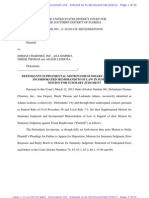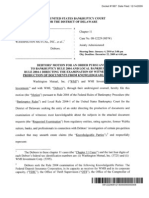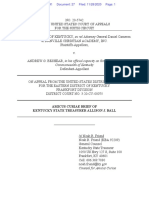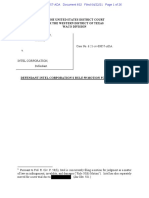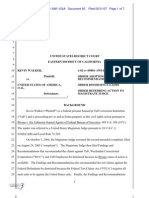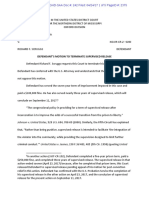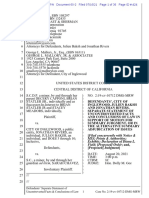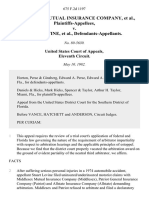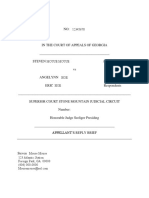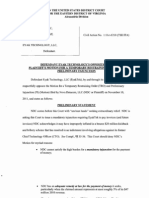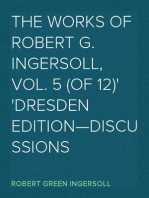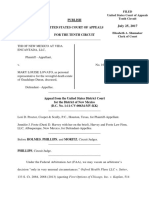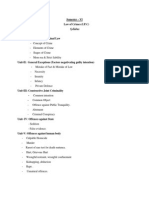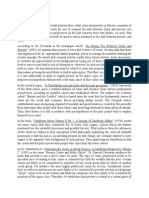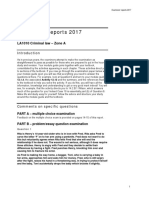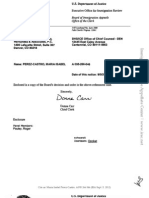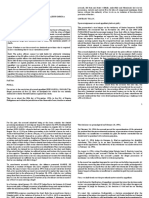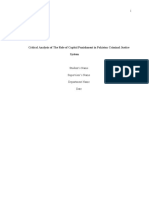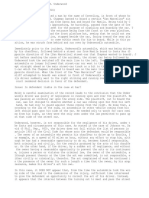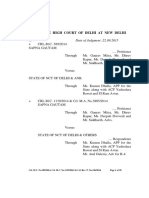United States v. Dailin Pico Rodriguez, 11th Cir. (2012)
United States v. Dailin Pico Rodriguez, 11th Cir. (2012)
Uploaded by
Scribd Government DocsCopyright:
Available Formats
United States v. Dailin Pico Rodriguez, 11th Cir. (2012)
United States v. Dailin Pico Rodriguez, 11th Cir. (2012)
Uploaded by
Scribd Government DocsOriginal Description:
Copyright
Available Formats
Share this document
Did you find this document useful?
Is this content inappropriate?
Copyright:
Available Formats
United States v. Dailin Pico Rodriguez, 11th Cir. (2012)
United States v. Dailin Pico Rodriguez, 11th Cir. (2012)
Uploaded by
Scribd Government DocsCopyright:
Available Formats
Case: 11-15465
Date Filed: 11/30/2012
Page: 1 of 12
[DO NOT PUBLISH]
IN THE UNITED STATES COURT OF APPEALS
FOR THE ELEVENTH CIRCUIT
________________________
No. 11-15465
Non-Argument Calendar
________________________
D.C. Docket No. 1:11-cr-20352-CMA-1
UNITED STATES OF AMERICA,
llllllllllllllllllllllllllllll Plaintiff - Appellee
llllllllllllllllllllllllllllllllCross Appellant,
versus
DAILIN PICO RODRIGUEZ,
lllllllllllllllllllllllllllllllllDefendant - Appellant
lllllllllllllllllllllllllllllllllCross Appellee.
________________________
Appeals from the United States District Court
for the Southern District of Florida
________________________
(November 30, 2012)
Before WILSON, MARTIN and FAY, Circuit Judges.
Case: 11-15465
Date Filed: 11/30/2012
Page: 2 of 12
PER CURIAM:
Dailin Pico Rodriguez appeals her convictions and concurrent 50-month
sentences for two counts of making false statements in violation of
18 U.S.C. 1001(a)(2). On appeal, Rodriguez argues that the district court: (1)
erred by failing to sustain her objections to the governments comments made
during closing argument; (2) improperly applied a three-level sentencing
enhancement when it found her to have substantially interfered with the
administration of justice; and (3) improperly applied a two-level sentencing
enhancement when it found her offense was extensive in scope, planning, or
preparation.
The government cross-appeals, arguing that the district court lacked
jurisdiction to change Rodriguezs 50-month sentences from running
consecutively to running concurrently with her undischarged term of
imprisonment.
I. Background
On July 21, 2011, a federal grand jury indicted Rodriguez for three counts
of knowingly making false statements to federal officials, in violation of 18 U.S.C.
1001(a)(2). According to the indictment, on or about February 4, 2010,
Rodriguez, an inmate in the Federal Detention Center (FDC) in Miami, knowingly
2
Case: 11-15465
Date Filed: 11/30/2012
Page: 3 of 12
and falsely represented to a special agent within the Department of Justice, that her
prison-issued clothing contained semen of a correctional officer who had sexually
assaulted her. On or about February 12, 2010, Rodriguez told the same story to a
Federal Bureau of Investigation (FBI) special agent. On or about February 25,
2010, Rodriguez knowingly and falsely told an FBI special agent that she had
saved hair cuttings containing the semen of an FDC correctional officer who had
sexually assaulted her. When tested, the DNA matched that of Rodriguezs
boyfriend. The DNA did not match the DNA of the FDC correctional officer
Rodriguez alleged had sexually assaulted her.
A jury returned a guilty verdict on all counts. Count Two, however, was
dropped; Rodriguez was only sentenced on Counts One and Three, each count
carrying a 50-month sentence.
On November 15, 2011, the district court held that the current sentences
would be consecutive to the undischarged term of imprisonment. The minute
entry for sentencing, however, reflected that the current sentence was to run
concurrently with the undischarged term. Rodriguez immediately filed notice of
appeal. On November 16, 2011, the district court entered an amended judgment,
ordering that the 50-month sentences instead run concurrently with Rodriguezs
undischarged term of imprisonment. The district court did not issue an
3
Case: 11-15465
Date Filed: 11/30/2012
Page: 4 of 12
accompanying order or opinion explaining its reasoning for entering the amended
judgment. Rodriguez again filed notice of appeal on November 18, 2011. The
government filed notice of cross-appeal on December 16, 2011.
II. Analysis
A. Rodriguezs Claims on Appeal
1. Prosecutorial Misconduct
Rodriguez argues that the following comments made by the prosecutor in
closing argument were not based on evidence and amounted to prosecutorial
misconduct: (1) Rodriguezs allegations of sexual assault could have ruined the
life of the accused correctional officer, and (2) because investigators spent time
investigating Rodriguezs allegations, real cases were neglected.
We review claims of prosecutorial misconduct de novo. United States v.
Eckhardt, 466 F.3d 938, 947 (11th Cir. 2006). To establish prosecutorial
misconduct, the defendant must show both that the prosecutors remarks were
improper, and that those remarks prejudicially affected her substantial rights. Id.
While a prosecutor may not exceed the evidence presented at trial during her
closing argument, she may state conclusions drawn from the evidence presented at
trial. United States v. Bailey, 123 F.3d 1381, 1400 (11th Cir. 1997). Although a
prosecutor may not make an argument directed to passions or prejudices of the
4
Case: 11-15465
Date Filed: 11/30/2012
Page: 5 of 12
jurors instead of an understanding of the facts and law, there is no prohibition on
colorful and perhaps flamboyant remarks if they relate to the evidence adduced at
trial. Id. (internal citations and quotation marks omitted). A prosecutor may
argue the conclusions that the jury should draw from the evidence. United States
v. Johns, 734 F.2d 657, 663 (11th Cir. 1984).
In addition to showing that the prosecutors remarks were improper, a
defendant must also show that those remarks prejudiced her substantial rights.
Eckhard, 466 F.3d at 947. Improper remarks prejudice the defendants substantial
rights if there is a reasonable probability that the outcome of the trial would have
been different but for the remarks. Id. If the record contains sufficient
independent evidence of guilt, any error is harmless. Id.
Here, the prosecutors remarks were not improper and did not prejudice
Rodriguezs substantial rights. When the prosecutor told the jury that the agents
had to spend time investigating Rodriguezs allegations and thus could not
investigate real cases, the prosecutor likely intended to remind the jury of the fact
that Rodriguezs lies were material and had real consequences. Similarly, the
prosecutors comment that Rodriguezs lies could have ruined the correctional
officers life was a common-sense inference as to the likely consequences of
Rodriguezs lies. See e.g. Bailey, 123 F.3d at 1400; Johns, 734 F.2d at 663.
5
Case: 11-15465
Date Filed: 11/30/2012
Page: 6 of 12
The prosecutors comments during closing argument were not improper and
did not prejudice Rodriguezs substantial rights.
2. Three-Level Enhancement
Next, Rodriguez contends that the district court erred in determining that
she substantially interfered with the administration of justice. Specifically,
Rodriguez argues that the three-level enhancement cannot apply because the
government resources expended were part of the investigation into and the
prosecution of her false claims. See United States v. Johnson, 485 F.3d 1264,
1271 (11th Cir. 2007) (noting that the government correctly recognized at
sentencing that it could not rely on any investigative costs incurred prior to
Johnsons false testimony or the expenses associated with prosecuting Johnson's
underlying perjury offense.).
We review the district courts factual findings for clear error and its
application of the Guidelines de novo. United States v. Newman, 614 F.3d 1232,
1235 (11th Cir. 2010) (internal quotation marks omitted). Section 2J1.2(b)(2) of
the Guidelines provides a three-level enhancement if the offense resulted in a
substantial interference with the administration of justice. U.S.S.G.
2J1.2(b)(2). The commentary explains that substantial interference with the
administration of justice includes, among other things, the unnecessary
6
Case: 11-15465
Date Filed: 11/30/2012
Page: 7 of 12
expenditure of substantial governmental or court resources. 2J1.2 cmt. n.1.
In United States v. Johnson, we interpreted this commentary with regard to
a perjury offense. 485 F.3d at 1271. We upheld the district courts application of
a three-level enhancement under 2J1.3(b)(2) for unnecessary expenditure of
substantial government or court resources. As a result of the defendants false
grand jury testimony, the government was forced to identify and interview several
other witnesses, review the defendants records, and reconvene the grand jury,
which required the government to pay travel expenses for grand jury members,
prosecutors, and witnesses. Id. at 1272. We also held that the government need
not specify the number of hours expended by government employees to sustain the
enhancement. Id. at 1271.
In this case, the record shows the expenditure of substantial government
resources that were required to investigate Rodriguezs initial claims of sexual
assault. First, Rodriguez was interviewed on multiple occasions by different
agents. She was moved to a different jail during the investigation. An Assistant
United States Attorney had to prepare a search warrant in order to obtain DNA
from the alleged perpetrator. DNA had to be collected from Rodriguezs
boyfriend and her alleged attacker. Lastly, the DNA collected (pants, hair, saliva)
had to be tested and analyzed. DNA testing and analysis is a time consuming and
7
Case: 11-15465
Date Filed: 11/30/2012
Page: 8 of 12
expensive process.
The record reflects that these resources were spent investigating
Rodriguezs allegations and identifying her alleged assailant, and thus are
attributable to her criminal conduct for purposes of the Guidelines. Rodriguez has
not shown that the district court clearly erred in determining that she substantially
interfered with the administration of justice by causing the unnecessary
expenditure of substantial governmental resources.
3. Two-Level Enhancement
Rodriguez contends that her offense was not extensive in scope, planning,
or preparation because it involved her claiming that she had been the victim of
sexual assault and because DNA analyses quickly proved that her allegations were
not supported in fact.
Section 2J1.2(b)(3)(C) provides for a two-level enhancement where the
offense was otherwise extensive in scope, planning, or preparation. U.S.S.G.
2J1.2(b)(3)(C). Rodriguezs offense was extensive in scope, planning, [and]
preparation and the district court did not err in so finding. See id.
Here, the district court found Rodriguezs offense extensive in scope and
planning because [it] involve[d] a gathering together of lies and
misrepresentations. This court agrees. It could not have been an easy task for
8
Case: 11-15465
Date Filed: 11/30/2012
Page: 9 of 12
Rodriguez to obtain a semen sample from her boyfriend while he visited her in a
guarded visiting room and to then use that semen in such a way that would allow
her to have semen-stained pants in her cell. To further corroborate her story,
Rodriguez provided her boyfriend with a sample of her hair so he could later
produce her hair with a semen sample on it. Rodriguez directed agents to her
boyfriend so he could give them the hair sample.
Given the constraints of incarceration, Rodriguezs offense clearly involved
extensive planning and preparation and the district court did not err in awarding
the two-level enhancement.
B. Governments Cross-Appeal
In its cross-appeal, the government maintains that the district court lacked
jurisdiction to amend Rodriguezs sentences. The original sentences were to run
consecutively to Rodriguezs current undischarged prison term, but the district
court amended the judgment so that the sentences would run concurrently.
Generally, the filing of a notice of appeal divests the district court of
jurisdiction over aspects of the case involved in the appeal. United States v.
Tovar-Rico, 61 F.3d 1529, 1532 (11th Cir. 1995). Nevertheless, the district court
retains jurisdiction to correct a sentence pursuant to Rule 35(a). Fed. R. App.
P. 4(b)(5).
9
Case: 11-15465
Date Filed: 11/30/2012
Page: 10 of 12
A district court may not modify a term of imprisonment except under
limited circumstances, including to the extent expressly permitted by statute or by
Federal Rule of Criminal Procedure 35. 18 U.S.C. 3582(c)(1)(B). Rule 35(a)
permits district courts to correct arithmetical, technical, or other clear errors in a
sentence within 14 days of sentencing. Fed. R. Crim. P. 35(a). The advisory
committee note explains that the authority to correct a sentence under Rule 35(a)
is intended to be very narrow and is not intended to give the court an opportunity
to change its mind about the appropriateness of a sentence. Fed. R. Crim.
P. 35 advisory committees note; see also United States v. Phillips, 597 F.3d 1190,
119697, 1199, 1201 (11th Cir. 2010) (stating that the limitations of Rule 35(a)
are jurisdictional in nature).
In United States v. Lett, we vacated a re-sentencing order where the district
courts original sentence was permissible under the Guidelines and the applicable
statutes. 483 F.3d 782, 791 (11th Cir. 2007). The district court initially imposed a
60-month sentence of imprisonment; 60 months was the mandatory minimum
sentence. Id. at 785. After further reflection, however, the court determined that,
under U.S.S.G. 5C1.2 and 18 U.S.C. 3553(f), it could sentence the defendant
below the statutory mandatory minimum. Id. at 78687. Acting within the time
limit, and purportedly under the authority provided by Rule 35(a), the district court
10
Case: 11-15465
Date Filed: 11/30/2012
Page: 11 of 12
modified the defendants sentence to below the mandatory minimum. Id. The
government appealed the district courts amended sentence. Id. at 787. On
appeal, this court explained that Rule 35(a) provides district courts with only a
narrow corrective power that is limited to obvious errors. Id. at 788. Because the
sentence originally imposed was plainly permissible under the Guidelines and
applicable statutes, we vacated the district courts re-sentencing order and
remanded with instructions to impose the original sentence. Id. at 788, 791.
Section 3742(b) of Title 18 authorizes the government to appeal an
otherwise final sentence if that sentence was imposed in violation of law.
18 U.S.C. 3742(b)(1). We have explained that the legislative history and
symmetrical structure of 3742 indicate Congresss intent that the government
and defendants be able to appeal sentences on the same terms. United States
v. Chavarria-Herrara, 15 F.3d 1033, 1036 (11th Cir. 1994). We have further held
that under 3742(b), this court has jurisdiction over government appeals of a
sentence reduced pursuant to Rule 35(b). Id.
Here, the district orally sentenced Rodriguez to two terms of 50-months
imprisonment to run consecutively to her undischarged term of imprisonment.
The initial sentencing order also reflects that the sentences run consecutively. On
the docket sheet, the minute entry for the sentencing proceedings reads that the 5011
Case: 11-15465
Date Filed: 11/30/2012
Page: 12 of 12
month sentences should run concurrently. After Rodriguez initially appealed, the
district court amended its sentencing order so that the two 50-month sentences
would run concurrently to the undischarged prison term. However, the district
court offered no explanation as to why it amended its judgment; there appears to
be no technical, arithmetical or other clear error in its original sentencing order.
See 18 U.S.C. 3582(c)(1)(B); Fed. R. Crim. P. 35(a); United States v. James, 597
F.3d 1190, 1196 (11th Cir. 2010) (noting that under Rule 35(a), a court can
correct a sentence only for arithmetical, technical, or other clear error.).
Consequently, the district court lacked jurisdiction to amend Rodriguezs
sentences, and in the absence of an arithmetical, technical, or other clear error, her
50-month sentences should run consecutively to her current undischarged prison
sentence.
Accordingly, we affirm in part, reverse in part, and remand to the district
court with instructions to reinstate its original judgment.
AFFIRMED IN PART, REVERSED IN PART, AND REMANDED.
12
You might also like
- Ethics and Jurisprudence Radiologic TechnologyDocument14 pagesEthics and Jurisprudence Radiologic TechnologyAndré Ian Daniel Aquino100% (2)
- Discussion Board#1-Beckworth v. BeckworthDocument4 pagesDiscussion Board#1-Beckworth v. BeckworthMuhammad Qasim Sajid0% (1)
- Anti-SLAPP Law Modernized: The Uniform Public Expression Protection ActFrom EverandAnti-SLAPP Law Modernized: The Uniform Public Expression Protection ActNo ratings yet
- Initial DisclosuresDocument6 pagesInitial DisclosuresBen KellerNo ratings yet
- Defendants Supplemental Motion For Summary Judgment and Incorporated Memorandum of Law in Support of Motion For Summary JudgmentDocument25 pagesDefendants Supplemental Motion For Summary Judgment and Incorporated Memorandum of Law in Support of Motion For Summary JudgmentcinaripatNo ratings yet
- Washington Mutual (WMI) - Debtors' Motion for an Order Pursuant to Bankruptcy Rule 2004 and Local Bankruptcy Rule 2004-1 Directing the Examination of Witnesses and Production of Documents from Knowledgeable PartiesDocument825 pagesWashington Mutual (WMI) - Debtors' Motion for an Order Pursuant to Bankruptcy Rule 2004 and Local Bankruptcy Rule 2004-1 Directing the Examination of Witnesses and Production of Documents from Knowledgeable Partiesmeischer100% (1)
- 2016-07-18 Motion For Temporary Restraining Order (00238839xC217C)Document16 pages2016-07-18 Motion For Temporary Restraining Order (00238839xC217C)paul weichNo ratings yet
- Publish United States Court of Appeals For The Tenth CircuitDocument10 pagesPublish United States Court of Appeals For The Tenth CircuitScribd Government Docs100% (1)
- 2015 Police Organization and Administration ExamsDocument6 pages2015 Police Organization and Administration ExamsShela Lapeña Escalona100% (3)
- Petition for Certiorari: Denied Without Opinion Patent Case 93-1413From EverandPetition for Certiorari: Denied Without Opinion Patent Case 93-1413No ratings yet
- FSA Motions Summary Judgment FILEDDocument41 pagesFSA Motions Summary Judgment FILEDAmmoLand Shooting Sports NewsNo ratings yet
- Motion For CR 11 Sanctions Against PlaintiffsDocument15 pagesMotion For CR 11 Sanctions Against PlaintiffsKaren PooleyNo ratings yet
- Louis E. Wolfson and Elkin B. Gerbert v. Honorable Edmund L. Palmieri, United States District Judge For The Southern District of New York, 396 F.2d 121, 2d Cir. (1968)Document7 pagesLouis E. Wolfson and Elkin B. Gerbert v. Honorable Edmund L. Palmieri, United States District Judge For The Southern District of New York, 396 F.2d 121, 2d Cir. (1968)Scribd Government Docs100% (1)
- Commonwealth of Kentucky: Amicus Curiae Brief of Kentucky State Treasurer Allison J. BallDocument108 pagesCommonwealth of Kentucky: Amicus Curiae Brief of Kentucky State Treasurer Allison J. BallChrisNo ratings yet
- Mortland v. Aughney Bankruptcy AppealDocument5 pagesMortland v. Aughney Bankruptcy AppealNorthern District of California BlogNo ratings yet
- Stillman OrderDocument40 pagesStillman OrderJohn ByrneNo ratings yet
- Plaintiffs' Response To Defendants' Motion To Dismiss And, Alternatively, Motion To Strike Portions of Plaintiffs' ComplaintDocument6 pagesPlaintiffs' Response To Defendants' Motion To Dismiss And, Alternatively, Motion To Strike Portions of Plaintiffs' ComplaintOmar Rodriguez OrtizNo ratings yet
- Adversary Proceeding ComplaintDocument288 pagesAdversary Proceeding ComplaintEmily Featherston GrayTvNo ratings yet
- Figuereo, A - SARATOGA - 4-2023 Case - Decision On Pretrial Motions 9-2023Document6 pagesFiguereo, A - SARATOGA - 4-2023 Case - Decision On Pretrial Motions 9-2023Wendy LiberatoreNo ratings yet
- USCOURTS Ilnd 1 - 16 CV 02895 1Document15 pagesUSCOURTS Ilnd 1 - 16 CV 02895 1DinSFLANo ratings yet
- 21-04-22 Intel's Rule 59 Motion For New TrialDocument26 pages21-04-22 Intel's Rule 59 Motion For New TrialFlorian MuellerNo ratings yet
- Order On Bivens ActionDocument7 pagesOrder On Bivens ActionWilliam TezakNo ratings yet
- Proposed InstructionsDocument11 pagesProposed Instructionstmccand100% (1)
- Jane McGinnis v. American Home Mortgage Servicing, Inc., 11th Cir. (2015)Document4 pagesJane McGinnis v. American Home Mortgage Servicing, Inc., 11th Cir. (2015)Scribd Government DocsNo ratings yet
- 2020 12 04 - 65 - BIS Corrected Motion To Amend PDFDocument15 pages2020 12 04 - 65 - BIS Corrected Motion To Amend PDFMatthew KezhayaNo ratings yet
- Petition For A Writ of Certiorari, Jevons v. Inslee, No. 23-490 (U.S. Nov. 6, 2023)Document231 pagesPetition For A Writ of Certiorari, Jevons v. Inslee, No. 23-490 (U.S. Nov. 6, 2023)RHTNo ratings yet
- Filed Court Document Motion For ReconsiderationDocument14 pagesFiled Court Document Motion For Reconsiderationleenav-1No ratings yet
- Obduskey - Cert. Reply - FILEDDocument15 pagesObduskey - Cert. Reply - FILEDDinSFLANo ratings yet
- Plemons v. Gale, 4th Cir. (2005)Document17 pagesPlemons v. Gale, 4th Cir. (2005)Scribd Government DocsNo ratings yet
- United States Court of Appeals For The Tenth CircuitDocument7 pagesUnited States Court of Appeals For The Tenth Circuitdillon-richardsNo ratings yet
- Daniel Baker's Motion For Reconsideration of DetentionDocument5 pagesDaniel Baker's Motion For Reconsideration of DetentionWCTV Digital TeamNo ratings yet
- TWC Motion To ContinueDocument13 pagesTWC Motion To ContinueTHROnlineNo ratings yet
- Northern Assurance Company of America, As Subrogee of Michael and Carole Morrell v. Square D Company, 201 F.3d 84, 2d Cir. (2000)Document9 pagesNorthern Assurance Company of America, As Subrogee of Michael and Carole Morrell v. Square D Company, 201 F.3d 84, 2d Cir. (2000)Scribd Government DocsNo ratings yet
- Janet Beasley v. Red Rock Financial Services, 4th Cir. (2014)Document13 pagesJanet Beasley v. Red Rock Financial Services, 4th Cir. (2014)Scribd Government DocsNo ratings yet
- Cockerham Kimberly V. Dr. Kelledy Patrick MDDocument19 pagesCockerham Kimberly V. Dr. Kelledy Patrick MDTami2020100% (1)
- Dickie Scruggs Petition For Early Release 042417Document9 pagesDickie Scruggs Petition For Early Release 042417Russ LatinoNo ratings yet
- Statler v. Inglewood: Supporting Evidence For Summary JudgmentDocument36 pagesStatler v. Inglewood: Supporting Evidence For Summary JudgmentTony OrtegaNo ratings yet
- Motion For Relief From Stay Alvin Marrero Vs Pesquera PRPDDocument48 pagesMotion For Relief From Stay Alvin Marrero Vs Pesquera PRPDEmily RamosNo ratings yet
- Motion For en Banc ReviewDocument22 pagesMotion For en Banc ReviewThe ForumNo ratings yet
- Middlesex Mutual Insurance Company v. Stuart Levine, 675 F.2d 1197, 11th Cir. (1982)Document11 pagesMiddlesex Mutual Insurance Company v. Stuart Levine, 675 F.2d 1197, 11th Cir. (1982)Scribd Government DocsNo ratings yet
- Kearns v. Cuomo, Et Al, 19-cv-00902 WDNY - Kearns - Navarro DeclarationDocument43 pagesKearns v. Cuomo, Et Al, 19-cv-00902 WDNY - Kearns - Navarro DeclarationDaniel T. WarrenNo ratings yet
- Dodd Insurance Services, Inc. and Tom Dodd, Jr. v. Royal Insurance Company of America, An Illinois Corporation F/k/a Royal-Globe Insurance Companies, 935 F.2d 1152, 10th Cir. (1991)Document11 pagesDodd Insurance Services, Inc. and Tom Dodd, Jr. v. Royal Insurance Company of America, An Illinois Corporation F/k/a Royal-Globe Insurance Companies, 935 F.2d 1152, 10th Cir. (1991)Scribd Government DocsNo ratings yet
- Hotfile's Motion in Limine To Preclude Use of Pejorative Terms PDFDocument4 pagesHotfile's Motion in Limine To Preclude Use of Pejorative Terms PDFDevlin HartlineNo ratings yet
- Denise Saluto v. Deutsche Bank Et Al. Court of AppealDocument11 pagesDenise Saluto v. Deutsche Bank Et Al. Court of AppealMartin AndelmanNo ratings yet
- United States Court of Appeals, Tenth CircuitDocument13 pagesUnited States Court of Appeals, Tenth CircuitScribd Government DocsNo ratings yet
- Not PrecedentialDocument5 pagesNot PrecedentialScribd Government DocsNo ratings yet
- Steven Mouse Appellant v. The Hoes in GA Court of AppealsDocument20 pagesSteven Mouse Appellant v. The Hoes in GA Court of AppealsJanet and JamesNo ratings yet
- Suddenlink LawsuitDocument44 pagesSuddenlink LawsuitJeff MorrisNo ratings yet
- Motion For Summary JudgmentDocument4 pagesMotion For Summary JudgmentJoe DonahueNo ratings yet
- Eyaktek Opposition To MotionDocument19 pagesEyaktek Opposition To Motionndc_exposedNo ratings yet
- June 21, 2017 Order of Instructions Pro Se Litigants Re. Electronic Filing (D.E. 8, SCH V FAB 17-80728-S.D.F.L.)Document2 pagesJune 21, 2017 Order of Instructions Pro Se Litigants Re. Electronic Filing (D.E. 8, SCH V FAB 17-80728-S.D.F.L.)lschneider68No ratings yet
- Laborers Health and Welfare Trust Fund for Northern California Laborers Vacation-Holiday Trust Fund for Northern California Laborers Pension Trust Fund for Northern California Laborers Training and Retraining Trust Fund for Northern California v. Westlake Development, a Corporation First Doe Second Doe Third Doe Black Corporation White Corporation Blue Co. And Grey Company, a Corporation, Westlake Development Company, Inc., Petitioner-Counter-Respondent-Appellee v. Local 389 Laborers Union Northern California District Council of Laborers, Respondents-Counter-Petitioners-Appellants, 53 F.3d 979, 1st Cir. (1995)Document9 pagesLaborers Health and Welfare Trust Fund for Northern California Laborers Vacation-Holiday Trust Fund for Northern California Laborers Pension Trust Fund for Northern California Laborers Training and Retraining Trust Fund for Northern California v. Westlake Development, a Corporation First Doe Second Doe Third Doe Black Corporation White Corporation Blue Co. And Grey Company, a Corporation, Westlake Development Company, Inc., Petitioner-Counter-Respondent-Appellee v. Local 389 Laborers Union Northern California District Council of Laborers, Respondents-Counter-Petitioners-Appellants, 53 F.3d 979, 1st Cir. (1995)Scribd Government DocsNo ratings yet
- Petition for Certiorari Denied Without Opinion: Patent Case 98-1972.From EverandPetition for Certiorari Denied Without Opinion: Patent Case 98-1972.No ratings yet
- Petition for Certiorari Denied Without Opinion: Patent Case 93-1518From EverandPetition for Certiorari Denied Without Opinion: Patent Case 93-1518No ratings yet
- Manual on the Character and Fitness Process for Application to the Michigan State Bar: Law and PracticeFrom EverandManual on the Character and Fitness Process for Application to the Michigan State Bar: Law and PracticeNo ratings yet
- Petition for Certiorari – Patent Case 94-782 - Federal Rule of Civil Procedure 12(h)(3) - Patent Statute 35 USC 261 – Judgment lien Statute 12 USC 1963From EverandPetition for Certiorari – Patent Case 94-782 - Federal Rule of Civil Procedure 12(h)(3) - Patent Statute 35 USC 261 – Judgment lien Statute 12 USC 1963Rating: 5 out of 5 stars5/5 (2)
- Petition for Certiorari – Patent Case 01-438 - Federal Rule of Civil Procedure 52(a)From EverandPetition for Certiorari – Patent Case 01-438 - Federal Rule of Civil Procedure 52(a)No ratings yet
- The Works of Robert G. Ingersoll, Vol. 5 (of 12) Dresden Edition—DiscussionsFrom EverandThe Works of Robert G. Ingersoll, Vol. 5 (of 12) Dresden Edition—DiscussionsNo ratings yet
- Petition for Certiorari Denied Without Opinion: Patent Case 96-1178From EverandPetition for Certiorari Denied Without Opinion: Patent Case 96-1178No ratings yet
- United States v. Kieffer, 10th Cir. (2017)Document20 pagesUnited States v. Kieffer, 10th Cir. (2017)Scribd Government DocsNo ratings yet
- United States v. Olden, 10th Cir. (2017)Document4 pagesUnited States v. Olden, 10th Cir. (2017)Scribd Government DocsNo ratings yet
- Coyle v. Jackson, 10th Cir. (2017)Document7 pagesCoyle v. Jackson, 10th Cir. (2017)Scribd Government Docs100% (1)
- United States v. Garcia-Damian, 10th Cir. (2017)Document9 pagesUnited States v. Garcia-Damian, 10th Cir. (2017)Scribd Government Docs100% (1)
- Payn v. Kelley, 10th Cir. (2017)Document8 pagesPayn v. Kelley, 10th Cir. (2017)Scribd Government Docs50% (2)
- Pecha v. Lake, 10th Cir. (2017)Document25 pagesPecha v. Lake, 10th Cir. (2017)Scribd Government DocsNo ratings yet
- City of Albuquerque v. Soto Enterprises, 10th Cir. (2017)Document21 pagesCity of Albuquerque v. Soto Enterprises, 10th Cir. (2017)Scribd Government DocsNo ratings yet
- Consolidation Coal Company v. OWCP, 10th Cir. (2017)Document22 pagesConsolidation Coal Company v. OWCP, 10th Cir. (2017)Scribd Government DocsNo ratings yet
- Brown v. Shoe, 10th Cir. (2017)Document6 pagesBrown v. Shoe, 10th Cir. (2017)Scribd Government DocsNo ratings yet
- Greene v. Tennessee Board, 10th Cir. (2017)Document2 pagesGreene v. Tennessee Board, 10th Cir. (2017)Scribd Government DocsNo ratings yet
- United States v. Roberson, 10th Cir. (2017)Document50 pagesUnited States v. Roberson, 10th Cir. (2017)Scribd Government DocsNo ratings yet
- Harte v. Board Comm'rs Cnty of Johnson, 10th Cir. (2017)Document100 pagesHarte v. Board Comm'rs Cnty of Johnson, 10th Cir. (2017)Scribd Government DocsNo ratings yet
- United States v. Kearn, 10th Cir. (2017)Document25 pagesUnited States v. Kearn, 10th Cir. (2017)Scribd Government DocsNo ratings yet
- Apodaca v. Raemisch, 10th Cir. (2017)Document15 pagesApodaca v. Raemisch, 10th Cir. (2017)Scribd Government DocsNo ratings yet
- United States v. Windom, 10th Cir. (2017)Document25 pagesUnited States v. Windom, 10th Cir. (2017)Scribd Government DocsNo ratings yet
- Publish United States Court of Appeals For The Tenth CircuitDocument24 pagesPublish United States Court of Appeals For The Tenth CircuitScribd Government DocsNo ratings yet
- United States v. Voog, 10th Cir. (2017)Document5 pagesUnited States v. Voog, 10th Cir. (2017)Scribd Government DocsNo ratings yet
- United States v. Magnan, 10th Cir. (2017)Document27 pagesUnited States v. Magnan, 10th Cir. (2017)Scribd Government DocsNo ratings yet
- Publish United States Court of Appeals For The Tenth CircuitDocument14 pagesPublish United States Court of Appeals For The Tenth CircuitScribd Government Docs100% (1)
- United States v. Muhtorov, 10th Cir. (2017)Document15 pagesUnited States v. Muhtorov, 10th Cir. (2017)Scribd Government DocsNo ratings yet
- United States v. Henderson, 10th Cir. (2017)Document2 pagesUnited States v. Henderson, 10th Cir. (2017)Scribd Government DocsNo ratings yet
- United States v. Kundo, 10th Cir. (2017)Document7 pagesUnited States v. Kundo, 10th Cir. (2017)Scribd Government DocsNo ratings yet
- NM Off-Hwy Vehicle Alliance v. U.S. Forest Service, 10th Cir. (2017)Document9 pagesNM Off-Hwy Vehicle Alliance v. U.S. Forest Service, 10th Cir. (2017)Scribd Government DocsNo ratings yet
- United States v. Magnan, 10th Cir. (2017)Document4 pagesUnited States v. Magnan, 10th Cir. (2017)Scribd Government DocsNo ratings yet
- Northern New Mexicans v. United States, 10th Cir. (2017)Document10 pagesNorthern New Mexicans v. United States, 10th Cir. (2017)Scribd Government DocsNo ratings yet
- Pledger v. Russell, 10th Cir. (2017)Document5 pagesPledger v. Russell, 10th Cir. (2017)Scribd Government DocsNo ratings yet
- Publish United States Court of Appeals For The Tenth CircuitDocument17 pagesPublish United States Court of Appeals For The Tenth CircuitScribd Government DocsNo ratings yet
- Coburn v. Wilkinson, 10th Cir. (2017)Document9 pagesCoburn v. Wilkinson, 10th Cir. (2017)Scribd Government DocsNo ratings yet
- Robles v. United States, 10th Cir. (2017)Document5 pagesRobles v. United States, 10th Cir. (2017)Scribd Government DocsNo ratings yet
- Criminal Procedure Code: Sections: 436 - 439Document31 pagesCriminal Procedure Code: Sections: 436 - 439Shweta GajbhiyeNo ratings yet
- Dunlao v. CADocument7 pagesDunlao v. CAPamela BalindanNo ratings yet
- IPC SyllabusDocument5 pagesIPC SyllabusVinay SahuNo ratings yet
- Crs4 FinalsDocument76 pagesCrs4 Finalsit's raizzielleeeNo ratings yet
- Sample - Hong Kong Criminal Procedure Notes PDFDocument7 pagesSample - Hong Kong Criminal Procedure Notes PDFvasaberielNo ratings yet
- Branson Arrest Report - April 5, 2013 To April 11, 2013Document4 pagesBranson Arrest Report - April 5, 2013 To April 11, 2013BransonCrimeNo ratings yet
- Juvenile Drunk Driver SentencedDocument2 pagesJuvenile Drunk Driver Sentencedthe kingfishNo ratings yet
- Literature ReviewDocument2 pagesLiterature ReviewGovind BharatNo ratings yet
- B Romion PDFDocument15 pagesB Romion PDFhasnat shahriarNo ratings yet
- RUBIN TAD-Y y BABOR, Petitioners, vs. PEOPLE OF THE PHILIPPINES, RespondentDocument63 pagesRUBIN TAD-Y y BABOR, Petitioners, vs. PEOPLE OF THE PHILIPPINES, RespondentRoseller SasisNo ratings yet
- Ca 103Document35 pagesCa 103Marc John Lee Dela CruzNo ratings yet
- Nuremberg Moot Court 2019Document14 pagesNuremberg Moot Court 2019HADTUGINo ratings yet
- Cases & DoctrinesDocument165 pagesCases & Doctrinessam espinasNo ratings yet
- Muti Prelim Exam (Referral Letter)Document4 pagesMuti Prelim Exam (Referral Letter)Sam SamNo ratings yet
- PCinmates PDFDocument7 pagesPCinmates PDFJournal Star police documentsNo ratings yet
- Maria Isabel Perez-Castro, A095 266 046 (BIA Sept. 5, 2012)Document16 pagesMaria Isabel Perez-Castro, A095 266 046 (BIA Sept. 5, 2012)Immigrant & Refugee Appellate Center, LLC0% (1)
- Crim 1 Final Exam SampleDocument1 pageCrim 1 Final Exam SampleRobert Kane Malcampo ReyesNo ratings yet
- Plea in MitigationDocument8 pagesPlea in Mitigationxoxo LynnetteNo ratings yet
- People V Garcia Digest and Full TextDocument4 pagesPeople V Garcia Digest and Full TextLuz Celine CabadingNo ratings yet
- Critical Analysis of The Role of Capital Punishment in Pakistan Criminal Justice SystemDocument8 pagesCritical Analysis of The Role of Capital Punishment in Pakistan Criminal Justice SystemBrianNo ratings yet
- Unit 8 Non - Fatal Offences Against The Person LectureDocument29 pagesUnit 8 Non - Fatal Offences Against The Person LectureElliot Mfune Jr.No ratings yet
- J. H. Chapman vs. James M. UnderwoodDocument3 pagesJ. H. Chapman vs. James M. UnderwoodJenine QuiambaoNo ratings yet
- Criminal Procedure Reviewer Rule 110 112Document26 pagesCriminal Procedure Reviewer Rule 110 112Ken Tuazon100% (1)
- People v. FernandezDocument4 pagesPeople v. FernandezMarchini Sandro Cañizares KongNo ratings yet
- Delhi HC Levies Costs of Rs 40 000 On Woman For Abuse of Process of Court and Wasting Court S Time PDFDocument18 pagesDelhi HC Levies Costs of Rs 40 000 On Woman For Abuse of Process of Court and Wasting Court S Time PDFsumitkejriwalNo ratings yet
- DCADocumentDocument6 pagesDCADocumentJason SpottsNo ratings yet
- People v. DaganiDocument13 pagesPeople v. DaganiLance LagmanNo ratings yet
- Af 1 - IndictmentDocument11 pagesAf 1 - Indictmentblankamnco0% (1)




